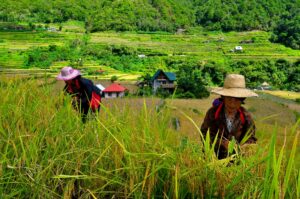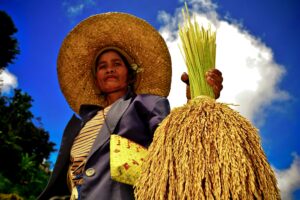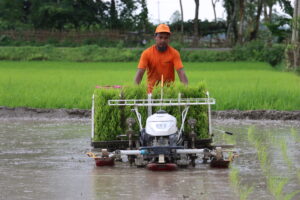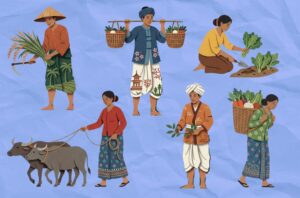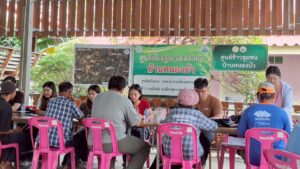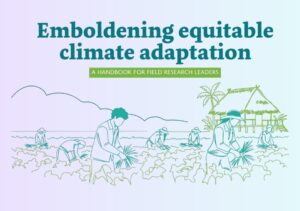Rice research can play a major role in achieving many of the eight United Nations Millennium Development Goals (MDGs), particularly those that call for the eradication of poverty and hunger, and for environmental sustainability. The International Rice Research Institute (IRRI) conducts research that regularly leads to validated technologies that have the potential to improve rice farming and so contribute to the MDGs.
The argument for rice research goes something like this: as more farmers use improved technologies, their communities achieve better food security while their income increases, thereby improving the livelihoods of those farmers and their communities. A sound argument indeed, but to realize the potential of the research, the effective transfer of these new technologies onto farms is vital.“Effective,” in this sense, means that farmers understand both the new technology and the technology’s effect on their farms. Crucially, farmers must feel compelled and sufficiently skilled to implement the technology. At this point, a training agenda—as opposed to a research agenda—becomes key to the successful transfer of the new technologies and a requirement for maximizing their impact.
To obtain sustainable impact from the results of a research agenda, technical knowledge, although vital, is not enough. “Training for greater impact” must incorporate not only technical knowledge but also the range of associated skills needed for implementing the new technologies. These skills include personal attitudes, project design and management, time management, and effective communication. Often, these additional skills are overlooked or forgotten because science communities such as IRRI’s—where such skills are part and parcel of everyday life—sometimes take them for granted. But these attitudes and skills form a “hidden” agenda that should be incorporated into technology transfer.
Validated scientific content, which forms the basis of new technologies, is created by IRRI scientists working with their partners from the national agricultural research and extension systems (NARES). The challenge of “training for greater impact” is to expand training from individual technical events to training Researchers and trainers who implement new technologies should teach management and communication skills as well as technical knowledge. Only when these are learned together and in context can we be sure of effective and sustainable adoption of technology that includes the necessary personal, management, and communication skills in concert with the requisite technical skills. Only when these skills are learned together—and in the context of farmers’ needs and community circumstances—can we be sure of effective, sustainable implementation.
This type of encompassing approach can only be achieved by a new and enhanced relationship between the IRRI science community and the available training expertise. We need to develop approaches that allow training participants to interact with the technical content and discuss, debate, and discover ways to incorporate it into their own environments. Once participants have determined how the new knowledge fits into their environment, additional training and support can provide the detailed technical and general skills required for implementation.
This does not mean that the existing range of technical seminars and training events are not useful—on the contrary, they will continue to give NARES scientists the opportunity to dip into the pool of scientific knowledge within the IRRI scientific community. But, when a new technology needs to be delivered to farmers, a different form of training is required if it is to achieve its potential impact. This training is based on the learning theory of constructivism, which allows learners to integrate new information into their own existing framework of knowledge, in their own time.
As a research institute, IRRI is expected by its donors to do just that—research. IRRI does not have a mandate to focus on the extension process of training farmers to incorporate new technologies into their farming systems. This is a job for the NARES, whose staff understand the issues on the ground in their own countries. Where IRRI can play a role, however, is in training the people who will themselves carry out the extension and training.
By rigorously addressing the form and structure of training, IRRI can increase the impact of its vast store of research results and further justify an expanding research agenda.
_________________________________________
David Shires is a training consultant for IRRI’s Training Center and International Programs Management Office.

